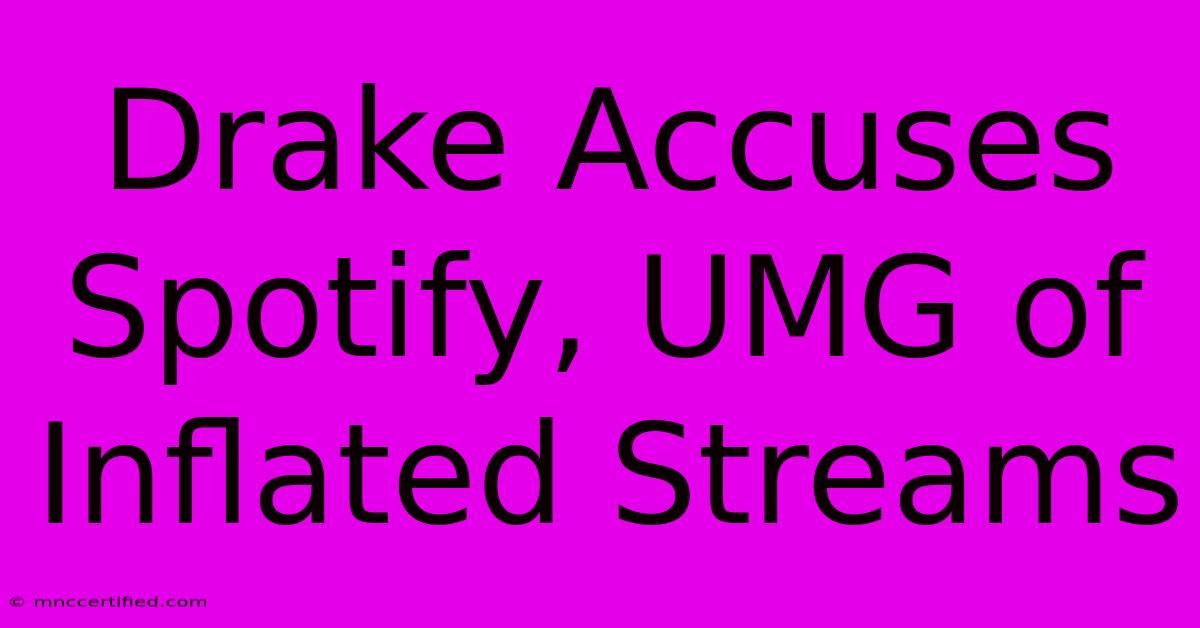Drake Accuses Spotify, UMG Of Inflated Streams

Table of Contents
Drake Accuses Spotify and UMG of Inflated Streams: A Deep Dive into the Controversy
The music industry is a complex ecosystem, and recently, a significant controversy erupted involving one of its biggest stars. Drake, a globally recognized artist, publicly accused Spotify and Universal Music Group (UMG) of manipulating stream counts, alleging inflated numbers that misrepresent the actual popularity of his music and potentially impact artist royalties. This article delves into the accusations, explores the potential implications, and examines the broader context of the streaming industry's transparency and fairness.
The Core of Drake's Accusations
Drake's accusations, while not explicitly detailed in a formal statement, were implied through various social media interactions and industry whispers. The core of his argument centers on the idea that Spotify and UMG are artificially inflating stream counts, either directly or indirectly, leading to inaccurate royalty payments and a skewed perception of musical success. This manipulation, if proven, would drastically alter the landscape of the music industry, affecting artists at all levels.
What are the potential methods of stream inflation?
Several theories are circulating regarding how stream inflation might occur:
- Fake streams: Bots or automated systems could generate fake streams, artificially boosting play counts without genuine listener engagement.
- Payola disguised as marketing: UMG might be engaging in practices that resemble payola, where money is exchanged for guaranteed streams or playlist placements, resulting in inflated numbers that are not organic.
- Data manipulation: There is speculation of internal data manipulation within Spotify or UMG's systems to artificially increase stream counts for specific artists or tracks.
These methods, if employed, represent serious breaches of trust and could have significant legal and ethical ramifications.
The Implications for Artists and the Industry
The impact of inflated stream counts extends far beyond Drake himself. If this practice is widespread, it means:
- Unfair royalty distribution: Artists are paid based on stream counts. Inflated numbers directly affect royalty payments, potentially depriving artists of deserved compensation and benefiting those involved in the manipulation.
- Distorted perception of success: Inflated numbers obscure the true popularity of songs and artists, leading to inaccurate assessments of success and hindering the opportunities of those with genuinely high engagement.
- Erosion of trust: The accusations erode public trust in the integrity of streaming platforms and record labels, impacting their credibility and future relationships with artists.
- Legal repercussions: Such practices could violate numerous laws and regulations relating to fraud, deceptive trade practices, and accurate reporting of financial data.
Spotify and UMG's Response (or Lack Thereof)
At the time of writing, both Spotify and UMG have yet to offer a direct and comprehensive response to Drake's accusations. The silence only fuels speculation and adds to the growing unease within the music industry. Transparency and accountability are crucial to restoring trust and ensuring fair practices.
The Larger Conversation about Streaming Transparency
Drake's accusations highlight a larger, ongoing conversation about the lack of transparency within the streaming industry. Artists often lack access to detailed data regarding their streams and royalties, making it difficult to verify the accuracy of reported figures. The debate calls for increased transparency and independent audits to ensure fair compensation for all artists, regardless of their label or level of popularity.
Moving Forward: The Need for Reform
The situation necessitates a significant overhaul in how the music streaming industry operates. Increased transparency, independent audits of stream data, and stronger regulatory frameworks are crucial for restoring fairness and trust. Without these changes, the industry risks further alienating artists and damaging its long-term sustainability. The controversy surrounding Drake's accusations serves as a stark reminder of the urgent need for reform within the digital music landscape. The future of the music industry depends on its ability to address these critical concerns promptly and effectively.

Thank you for visiting our website wich cover about Drake Accuses Spotify, UMG Of Inflated Streams. We hope the information provided has been useful to you. Feel free to contact us if you have any questions or need further assistance. See you next time and dont miss to bookmark.
Featured Posts
-
Adeles Next Chapter After Las Vegas
Nov 26, 2024
-
Tenbury Wells Tractor Incident Under Scrutiny
Nov 26, 2024
-
Lana Del Rey Hampden Park Glasgow 2024
Nov 26, 2024
-
Lopetegui May Recall Areola Vs Newcastle
Nov 26, 2024
-
Lopeteguis Surprise Newcastle Tactic Report
Nov 26, 2024